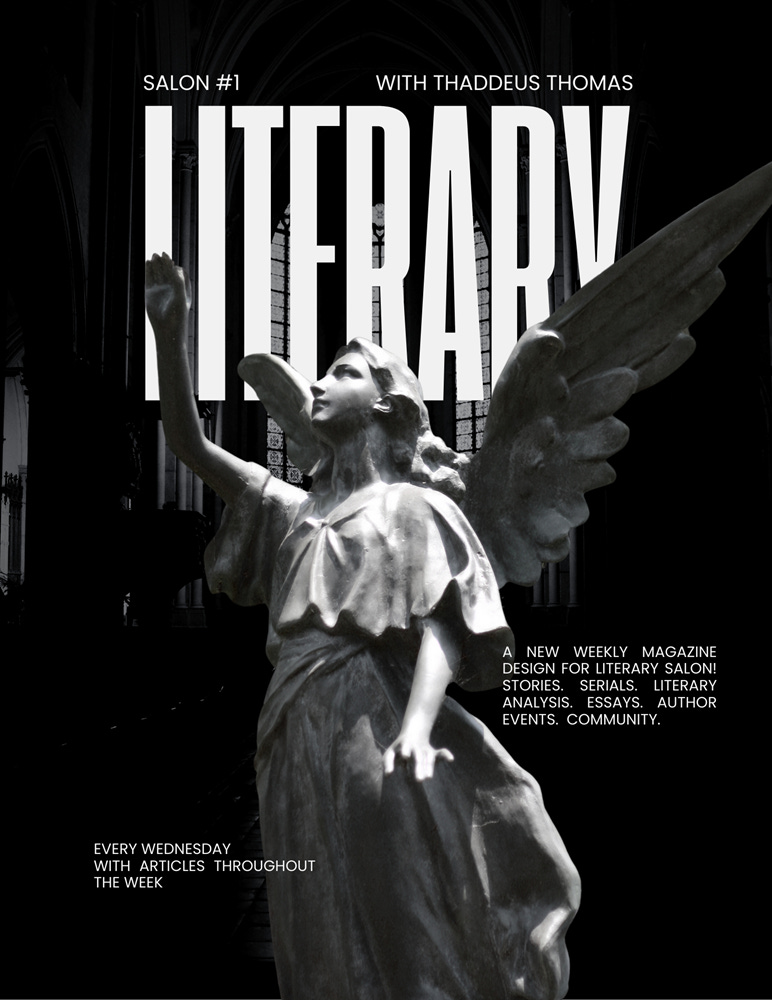Literary Salon #1
A Magazine to Manage your Emails
Before I wax poetic about Literary Salon’s experiment with a weekly magazine format, let’s cut to the chase. We can only cope with so much mail, and this (macro) newsletter has lots of (micro) newsletters. That means lots of mail. The Literary Salon magazine was born to help you better manage your Literary Salon emails without a fear of missing out.
And yes, I want it to be more than that: Literary Salon has been described as a must-have publication for all that it offers for both readers and writers alike. Now it can freely be all that and more without overwhelming my subscribers.
“I’ve been looking for a source that digs into style at the sentence level. Thaddeus’s page is the best I’ve come across so far.”
Hamish Kavanaugh, author of The Sudden Walk
Remember:
“literary” doesn’t just mean literary fiction.
My mission is to support well-written fiction and provide tools for everybody to expand their style with advanced prose techniques.
I call myself a literary fantasy author, after all.
“Now I am actually having fun writing and revising.”
Nuno Pinto, author of Nuno’s Substack
“Man, the Literary Salon is THE stack to be subscribed to if you’re a fiction writer.”
Corey Evans, author of Corey’s Substack and The Perennial Journal
Now is the perfect time to commit to a new relationship with the Literary Salon.
Not a subscriber? Subscribe at absolutely no cost.
Already a subscriber? Become a paid subscriber at a huge savings.
Already a paid subscriber? Become a True Fan and help me keep those discounts going for writers and readers on a tight literary budget.
A note to Substack app readers: if you wish to leave the app and visit my site directly, try thaddeusthomas.com. It will redirect you to literarysalon.thaddeusthomas.com without the app sending you back to my profile page. (While you’re here, as the note to email readers will apply to you as well, go ahead read that as well.)
A note to email readers: this magazine concept only works if you allow yourself to click on a link and leave the email. If you’ll make the commitment to do that, I’ll do everything I can to make it worth your time and effort. I’d simplify everything by making the magazine one page with all the necessary links, but email providers wouldn’t like that. Instead, I’ll mail you a cover page with most of the links removed, but with a click, you can visit the full version with all the links in tact, hosted on my Literary Salon site.
Manage Your Subscription
Every Section has a toggle. Toggle on the Sections you want to receive and toggle off the ones you don't. The magazine requires the toggle to be on for The Literary Salon, and you can toggle on the Sections you want to receive as soon as their posted. Everything else, you can toggle off and still keep updated weekly.
To choose which series come to your inbox, go to:
https://literarysalon.thaddeusthomas.com/account
Publishing Schedule
These cover page are published on Wednesdays. (Issue #1 may publish day or two early to allow me to troubleshoot the new format.)
The new cover will start with an introduction and will link to a few highlights from the previous week as well as spotlight other authors (and their newsletters). Over the week, as more pages are published, the cover page will grow to reflect that. The following Wednesday, as a new cover is posted, a version of the previous week’s cover will be emailed out with most of the links stripped away (potentially images, as well). Email readers can preview that week’s offerings and click through to the full-version for all the necessary links.
The Literary Salon #1
Reviewstack: The Cosmonaut part 4 by Stefan Baciu
Champion Series: Richard Davis, Championed by Keith Long
Developing a Board Game
Open-World Stories: re: the first stories
Peer-to-Peer Literary Criticism: Do we need less praise and more criticism?
Recent Fiction: short stories, emailed during my vacation
Haints
Shapeshifters in Love
In the Stacks: What not to miss.
Photho / Lit Zine: issue 0 by Pablo Baez and James Worth
I’m Everything You Think I Am by ARC
Bobby, the Dog by Nuno Pinto
Feel the itch to buy a book? Scratch your book itch with Literary Salon. (A limited time promotion.)
Looking for a fresh new Author Newsletter? Find a new author and get a book as a welcome present.
The Cosmonaut part 4 by Stefan Baciu
Let’s start with what I’ve already told Stefan. The story begins in the wrong place. It’s close, and there are only three paragraphs to lose, which isn’t bad. This is the beginning:
Decades he spent in this house of the dead, decades that turn into moments in his memory, the first of all his faculties that he abandons as he begins to pray. The Hermit scratches his beard, that long white snake slithering on the ground as he stands up praying on the cool sand facing the unforgiving sunrise asking for mercy from his unknowable all-loving Lord, the ruined entrance of the tomb behind him he prostrates falling and rising like the eagles that stride through the sky.
The writing has a Cormac-McCarthy level of disdain for the comma, but this captures my attention and imagination. It’s good.
What I didn’t know at this point, is there’s a Princes Bride quality to the story—a story told within the story—and Baciu is capturing the flavor of a certain kind of book. Maybe the first three paragraphs with all its preface-style world-building is appropriate for the kind of book he’s conjuring for us. Maybe the language captures the imagined author, but I’m reminded of my rule of warning when it comes to parody.
I’ve seen writers parody boring writing, and it doesn’t come across as parody. Just boring.
When we are attempting these kinds of narrative tricks, the fundamentals don’t change. It doesn’t matter what the source we’re imitating did. We’re still committed to rewarding the reader for the investment of their time, and that means that we begin the story with the story, not a quick history of the world. Without a character of interest in a promising situation, none of that information matters.
The first job of the writer is to make us care, and this is where I begin to care. I love that “first” sentence. I’m intrigued by the character.
Click through to read the full article.
Making It Up as I Go Alone
by Keith Long
Alright folks. This. is Richard Davis. It is an actual crime that more people have not read his stories. His publication ‘Making It Up As I Go Alone’ is a hidden gem I have been following and recommending for a while but I recently went to his stuff and scrolled around. Folks lemme tell you, it’s all good. Rather than listen to me, let him prove it. Here are some excerpts from my favorites, lines or moments that have stuck with me for months after. Final note, I went looking for Right Hand Blues a while ago and couldn’t figure out who had written it — All I remembered was the story, not the title or author. Well, I’ve been reunited at last:
“The anaesthetist was a successful, flamboyant man in his late forties. His bottle blond hair complimented his fake tan and was shaped into a rockabilly quiff. His forehead was Botox frozen, and his contact lenses were purple. He wore a large white stone set on a gold pinkie ring and an odour of cinnamon wafted from the folds of his pale blue boilersuit. Business was good.”
Right Hand Blues
“The lad sensed the approach and looked up at Batman’s masked face. He looked into the misty eyes, like those of a dead fish on a stainless-steel tray and felt sick. He jumped up and exited the tram three stops before his destination. He regarded himself as a tough nut who could look after himself, but Batman’s eyes had freaked the shit out of him.”
Click through the read the full article.
Developing a Board Game
Vacations often result in board-game ideas because my mind is idle and we’re playing more games than usual. These are not ideas I usually pursue.
When my daughter was little, we used to create and play our own board games. One with a Simpsons theme was particularly successful (with us—as we were the only two people who ever played these games), but since then, the ideas have just stayed ideas. This time, I’ve hit upon something intuitive and fun. The concept is simple but creates interesting game play—I think. To be sure, all of this has to emerge from my head and actually be played.
It also helps to be inspired by those who have come before. Christopher Schmitz is someone I’ve followed since our critique group days, and he’s been using Kickstarter for books and games. Check out what he’s been up to.
It’s hard to be certain how much psychological sway something like that has on pushing us forward. We see what others are doing on Substack, and it urges us to attempt more, achieve more. Community inspires.
This particular inspiration fuels a game called Stock Dogs, a variant term for herding dogs or sheep dogs. I was surprised to discover how many games have a sheepdog theme. Their popularity made me nervous at first, but thankfully, none of them do what my game does.
I think I’ve hit upon something special, and I’d like to talk about it.
Click through to read the full article.
Note: If something’s important to you, you’ll want to be subscribed directly to that section as well. There are times that by the time the magazine comes out, deadlines will have passed.
Open-World Fiction: re: the first stories
In my first article on flash fiction, I went on too long.
We’ve come to the deadline for the first stories for the open-world project. There’s been some confusion, but we’re not publishing them, yet. We need to read them all, and then write the rest of the stories.
Part of the confusion is that I gave you all the facts in a post that was just too long. Additionally, I’ve been on vacation, and if you asked me for information while I was in Finland, the “facts” I gave you might have been fishy.
Let’s try this again, but I’ll try to keep it brief.
But first of all:
Check out the work Haly, the Moonlight Bard ✒️ has done in both on our slack and at the worldbuilding hub for the open-world project.
What open-world writers need to know: Each author will write one story during this round. Do not publish it. You’ll message me the draft link and let me know if you’re available to write another story. When all the stories are ready, I’ll post the links for all of you to read…
Click through to read the full article.
A short but complete article for my magazine readers:
Peer-to-Peer Literary Criticism
Notes is the social-media side of Substack, available in the Substack app, and there, writers will sing the praises of other writers. The question becomes, should we be engaged in more literary criticism among peers within that space?
The answer is no.
On occasion, you will find peer critiques here at Literary Salon. In these cases where I’ve discussed the positive and negative aspects of a piece, I’ve reached out to the writers beforehand. It is possible to unintentionally say something detrimental which can be removed or remedied without compromising the critique. So far, once, I’ve been asked to remove one line and gladly did so.
These articles are comparable to the writings of a food critic.
That’s not appropriate for Notes which is a space better suited for (metaphorically speaking) foodies raving about their favorite Micheline-star restaurants. Such raves are entirely genuine, and we don’t have time and space to proclaim everyone who deserves our praise—let alone critique all the writing that doesn’t work for us.
There are other reasons, primary among them being that the writing I loathe may be the writing you love, and it’s hard enough for writers to find their audience without any of us getting in the way. A secondary reason is that being a strong reader and a gifted writer doesn’t guarantee a good critique. As writers, we have a proclivity to critique with too little knowledge. We commit the sin of rewriting other authors as a means of giving advice—and frankly, our reading comprehension isn’t always what we think it is. A critique is a skill which many writers lack.
No, we don’t need more criticism in social media. Leave trash criticism to Twitter (X).
We do need more reviews, and I’m asking Substack reviewers to adopt the “reviewstack” term as part of their titles, making reviews easier to find. These critiques can embrace the positive and negative, but they belong to the realm of long-form posts; and care should still be taken in addressing the perceived negatives.
It’s also important to note the difference between a review and a critique. A review is by readers for readers, and a critique leans more toward an audience of writers—in some cases even the author of the original piece.
We can all write a review.
A critique is dangerous work, and those of us practiced in its application are lucky to emerge unscathed. Meanwhile, there are thousands of writers who wield advice like an amateur bomb squad.
If by criticism, we mean reviews in newsletter posts—and short form reviews where they’ll most help the writer, such as on Amazon? Yes! We are in desperate need.
If by criticism, we mean critiques—in this article, I’m being much more open in my opinion on this matter than I’ve ever been, anywhere, under any circumstances. You might be the exception, but each of us who undertake criticism should hold ourselves suspect, knowing me may believe ourselves to be the exception when we are in fact the rule.
And what is the rule?
Most writers carry too many fatal flaws which may not reveal themselves negatively in their own writing but are glaring in the guidance they offer to others. Their advice is misguided, and their critiques are more likely to harm than to help. It’s simply not an area we should ever tread lightly.
If you’re a writer looking for a critique, I very rarely give them—and when I do, I focus on authors of tremendous skill or potential. Most writers don’t need my critique. They need tools, which I try to offer in my various theory and technique series, and even then, I avoid advice whenever possible.
I say all of this as someone who used to run a critique forum. Not only is it not what most writers need, most aren’t yet emotionally equipped to have their work challenged.
Some are.
If you have a thick skin and are ready for your work to be ripped open so you can build it again, better than before, I recommend Emil Ottoman.
— Thaddeus Thomas
As new pages are posted throughout the week, samples and links will be added above the article.
Recent Fiction
I emailed a few short stories during my vacation.
Haints
As I lay murdered and dying, I swore my revenge, never reckoning on what it would cost me.
Afterwards, I stood on the side of the road in my bare feet and overalls. The blacktop curved as it fell away, and just out of sight, beyond the bend, was the land where I died. Just a moment gone by and now I was here, feeling the cold of death but not chilled by it, staring down the way to the land I'd known for all my time living.
Age didn't have much meaning no more. I was a boy, and I was a man. I reckon I was everything I’d ever been.
Haints by Thaddeus Thomas
-
Shapeshifters in Love
I
Bill ignores the center racks, where the books change weekly and make him dizzy, and heads to the classics section. He picks up a book and begins to read. He reads the same book every day, almost the same three pages, moving forward a word or two each day. The book looks used now. The clerks frown at him, though he does not notice, and they want him to stop. They say nothing, however, because—as far as they can tell—he has never been in this store before, has never picked up that book before, has never read those three pages. It’s not his fault that every day someone enters—a man, a woman, a child, someone—and that someone picks up that copy of that book and reads it from three seventeen until three twenty-four. The book is Hemingway's The Old Man and The Sea. He is not yet halfway through.
Shapeshifters in Love by Thaddeus Thomas
In the Stacks
Worthy works from Substack authors.
Photho / Lit Zine: Issue 0
press play. study each photograph. read the text if there’s any.
A new audio-visual zine by Pablo Báez and James Worth
-
The night I almost drowned, I took a small hammer to a photo of myself.
Seven cracks bloomed across the glass.
In each: a different alias, staring back.
I Am Who Everything Think I Am by ARC
-
Bobby, the Dog
"I was born here," my mother said.
The photo was brittle, the edges thinned to nothing. I held it like breath, afraid it might come apart. On the back, someone had written 1946, five years after she came into the world. The image was mostly dark. If you squinted, you might take the slope for a roof.
Etched against it, two children. Their faces burned too bright, the way old photos sometimes do, like they’d caught fire from the inside. The one on the left, especially, burns with the whitest silver.
He held a dog close. She took the photo back.
"This dog. Our father killed it. I heard it whimper. I saw the bloody shovel. I touched it, the warm red. My brother couldn’t get it out of the house like he was told to."
She dragged her thumb across the picture…
Until May 21st, this page is a work in progress,
Thaddeus Thomas















Wonderful collection of work here. And I’ve got two ReviewStack posts in the works!
This is dope!